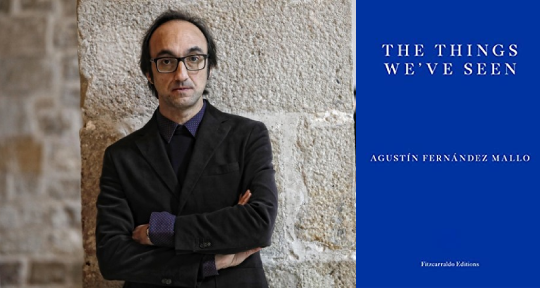Translated by Samuel Bollier, Jurj Salem’s “At the Circus” is a discombobulatingly charming, disarmingly hair-raising tale that elides joy and frustration, obfuscates reality and performance, and makes irony sincere. Things are not what they seem, which renders Bollier’s excellent translation of Salem’s easygoing prose all the more stirring; there, suited in the circus, we must imagine S. happy.
I’ve had the chance to read Quyên Nguyễn-Hoàng’s breathstopping beautiful self-translations in The Margins before; these two pieces in the new issue exude that same intrinsic conscience of precarious simultaneity, numbered and reversed, punctuated with “+” signs, a “delirious net of ten thousand dewdreams.” Quyên Nguyễn-Hoàng’s wordly creations turn from imagistic manifestation into pure interpretation.
Samuel’s parodic brilliance in his essay “Poets of Mirror Hatred” yields real laughter in an entirely serious, paradoxically internal essay about the division between the social and the cultural in poetic personas. What language exists for that which must not be expressed, at all costs, lest the self split? How must the reader read repression? Linking Kafka to two generations of modern Korean poetry, Samuel ends by critiquing the bright, hegemonic Asian American discourse of pain, transformed by their loudness into white noise: “To want more representation of Asian-American faces in American literature is to dream of your own cage.”
When Brandon Breen translates that “writing is obliquitous, but also ubiquitous,” I return to Ubah Cristana Ali Farah’s original contrast, “obliqua” versus “ubiqua,” in “The House of Termites,” a juxtaposition that encapsulates the attractions of Ali Farah’s style. By obliquely rebounding between various writers of exile, from Baldwin to Said to Kristeva, Mernissi, and Zambrano, Ali Farah’s essay makes a sensual ubiquity of this obliquitous displacement. To misappropriate Baldwin, you need strength to live in the “house of termites”; another kind of strength to let the termites get at it. Both strengths inhabit this essay.
Zhou Junyi’s conversation with filmmaker Tan Pin Pin crystallizes a certain vision of Singapore: a prism of public languages, spaces, and systems that shift as the microwave’s glass plate spins. I particularly love how the interview conveys the sounds of Singapore, and how we intellectualize it through subtitular structures, and formal and editorial decisions. Tan’s work lies in the instant before the intellectualization: “People will always know when a guest of honor arrives, but they don’t know what it feels like before the guest of honor arrives or even question why we have a guest of honor in the first place.”
—Michelle Chan Schmidt, Senior Assistant Editor READ MORE…



 This spirit of formal ambition is by no means limited to our Special Feature. After all, “as the reality of each time changes,” says
This spirit of formal ambition is by no means limited to our Special Feature. After all, “as the reality of each time changes,” says 

Blog Editors’ Highlights: Winter 2025
Reviewing the manifold interpretations and curiosities in our Winter 2025 issue.
In a new issue spanning thirty-two countries and twenty languages, the array of literary offers include textual experiments, ever-novel takes on the craft of translation, and profound works that relate to the present moment in both necessary and unexpected ways. Here, our blog editors point to the works that most moved them.
Introducing his translation of Franz Kafka’s The Trial in 2012, Breon Mitchell remarked that with every generation, there seems to be a need for a new translation of so-called classic works of literature. His iteration was radically adherent to the original manuscript of The Trial, which was diligently kept under lock and key until the mid-fifties; by then, it was discovered exactly to what extent Max Brod had rewritten and restructured the original looseleaf pages of Kafka’s original draft. It is clear from Mitchell’s note that he considers this edit, if not an offense to Kafka, an offense to the reader who has lost the opportunity to enact their own radical interpretation of the work: an interpretation that touched Mitchell so deeply, he then endeavored to recreate it for others.
In Asymptote’s Winter 2025 Issue, the (digital) pages are an array of surprising turns of phrase and intriguing structures—of literature that challenges what we believe to be literature, translations that challenge what we believe to be originality, and essays that challenge what we believe to be logic. I am always drawn to the latter: to criticism, and writing about writers. As such, this issue has been a treat.
With the hundredth anniversary of Kafka’s death just in the rearview and the hundredth anniversary of the publication of The Trial looming ever closer, the writer-turned-adjective has not escaped the interest of Asymptote contributors. Italian writer Giorgio Fontana, in Howard Curtis’s tight translation, holds a love for Kafka much like Breon Mitchell. In an excerpt from his book Kafka: A World of Truth, Fontana discusses how we, as readers, repossess the works of Kafka, molding them into something more simplistic or abstract than they are. In a convincing argument, he writes: “The defining characteristic of genius is . . . the possession of a secret that the poet has no ability to express.” READ MORE…
Contributors:- Bella Creel
, - Meghan Racklin
, - Xiao Yue Shan
; Languages: - French
, - German
, - Italian
, - Macedonian
, - Spanish
; Places: - Chile
, - France
, - Italy
, - Macedonia
, - Switzerland
, - Taiwan
, - Turkey
; Writers: - Agustín Fernández Mallo
, - Damion Searls
, - Elsa Gribinski
, - Giorgio Fontana
, - Lidija Dimkovska
, - Sedef Ecer
; Tags: - dystopian thinking
, - identity
, - interpretation
, - nationality
, - painting
, - political commentary
, - revolution
, - the Cypriot Question
, - the Macedonian Question
, - translation
, - visual art
, - Winter 2025 issue
, - world literature